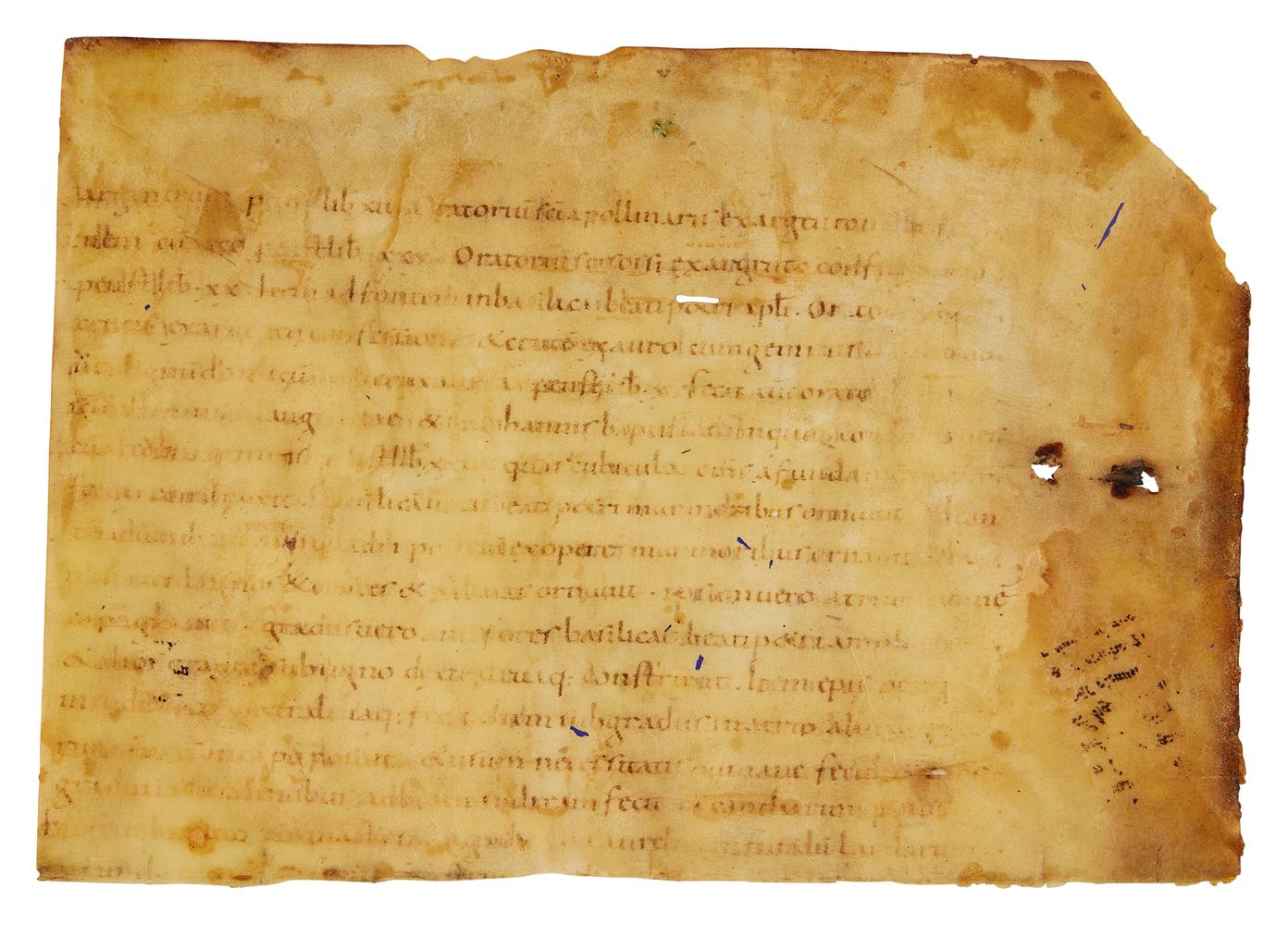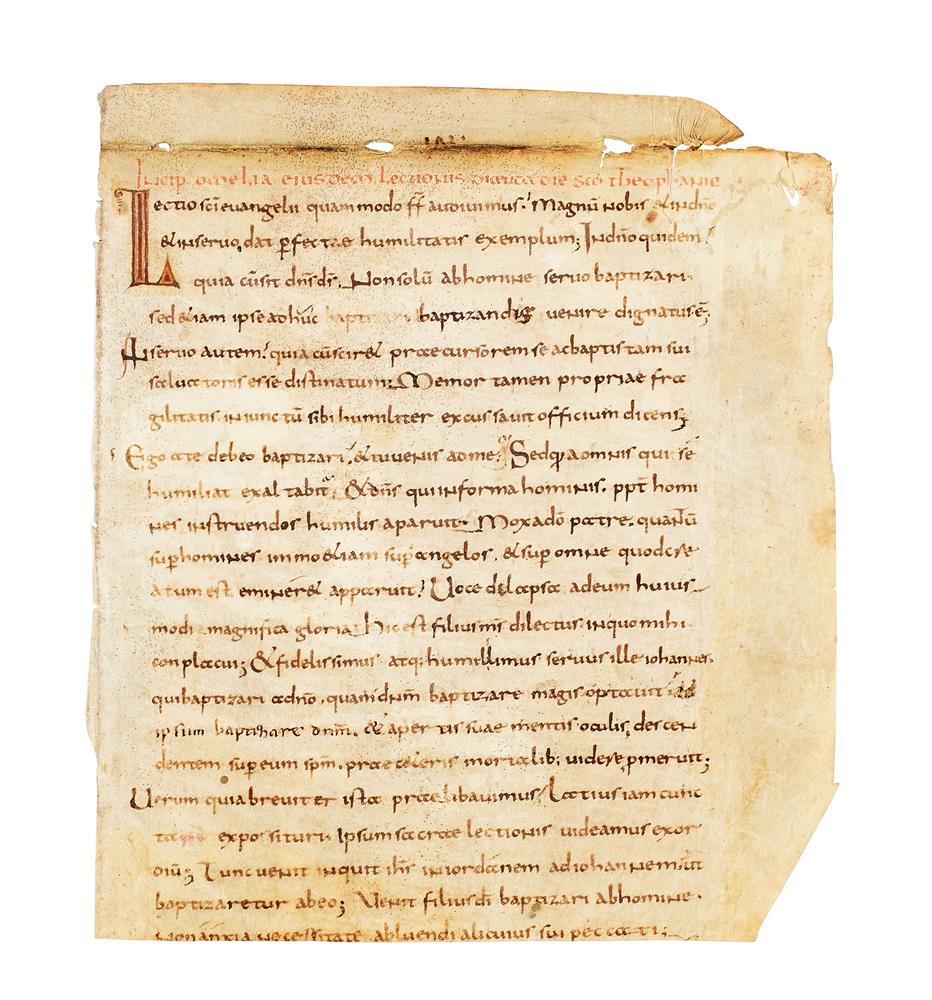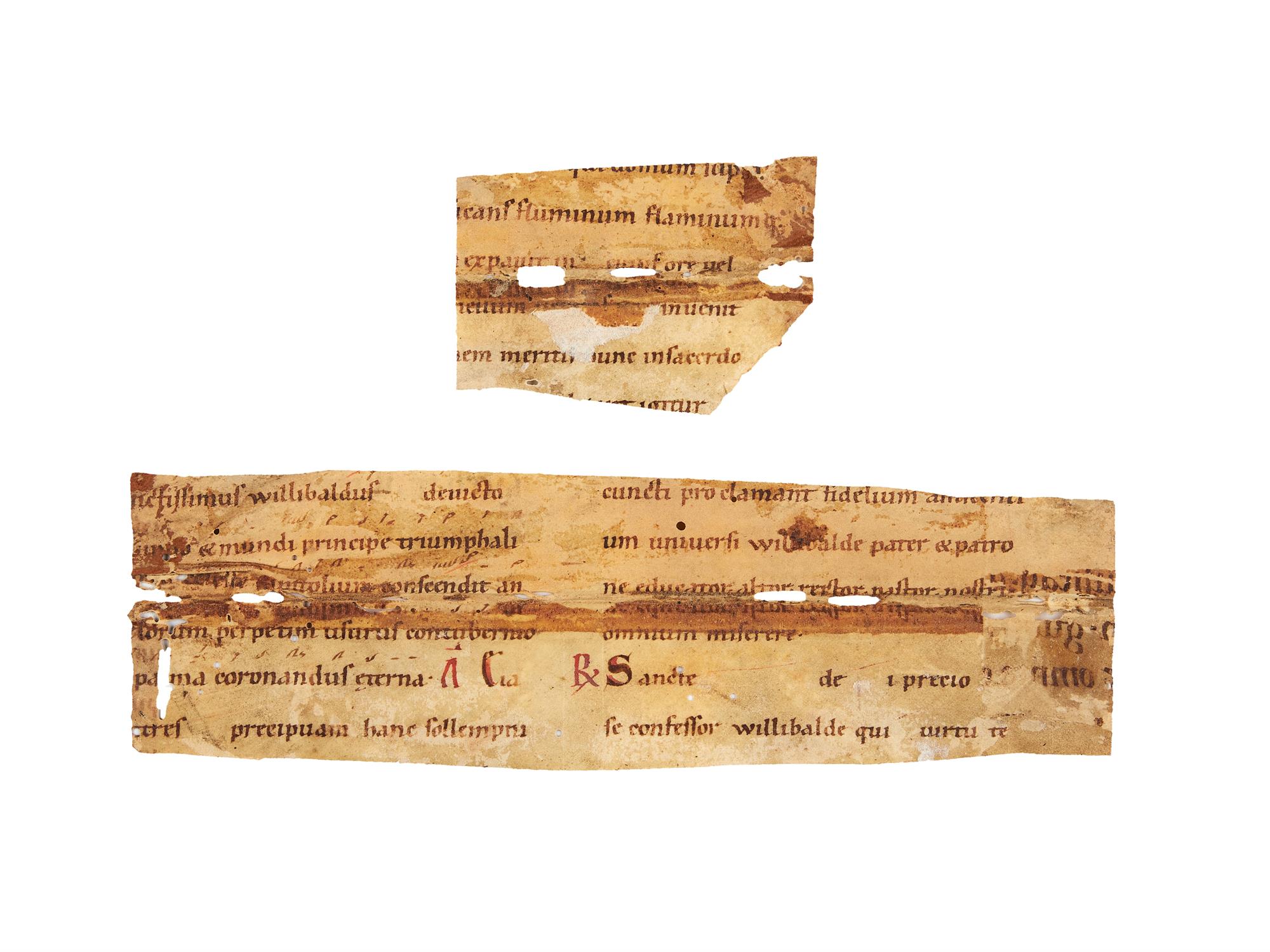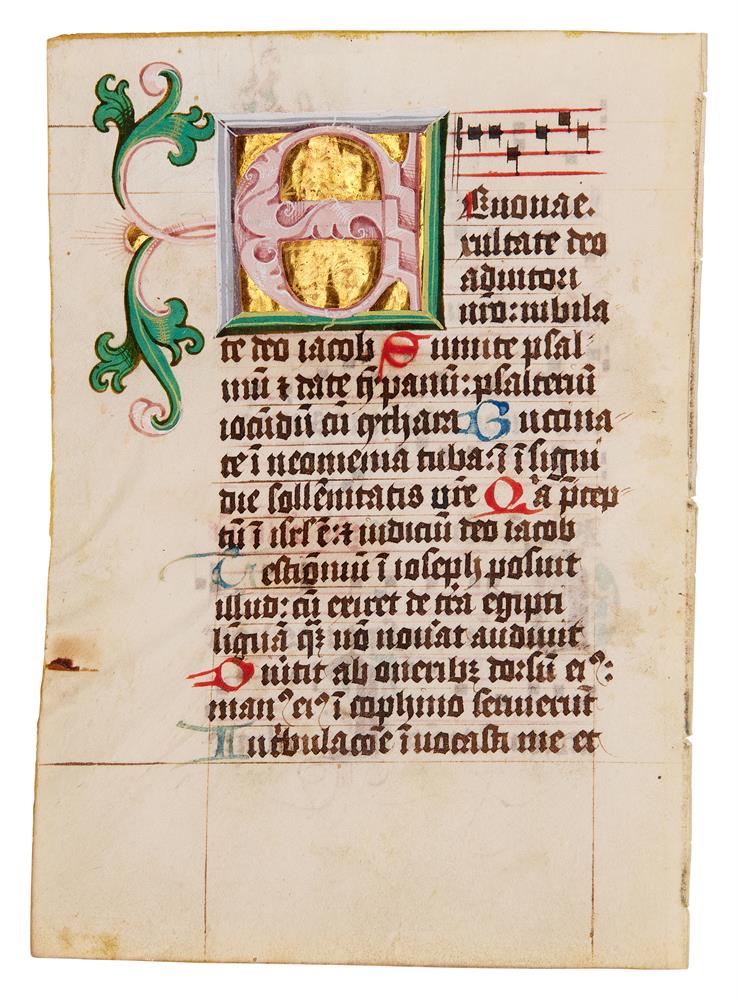Two cuttings from an early Liber Pontificalis, in Latin, manuscript on parchment [perhaps Poland, or south-east Germany, tenth century] Single leaf, bisected laterally, with a loss of a few lines at the cut-point, each cutting with remains of a single column of 16+13 lines in a rounded late Carolingian minuscule, with frequent use of et-ligature integrally within words, reused as pastedowns in a medieval binding (see below) and much scuffed and with large parts illegible, the parchment now translucent, in somewhat battered condition, 140 by 203mm. and 150 by 203mm. Provenance: 1. The localisation of these leaves is based on their reuse in the binding of a fourteenth-century manuscript perhaps from a Dominican chained library in either Poland, south-east Germany or a Polish-German mixed region such as Silesia (a border region partly in Poland, and containing much of Moravia and parts of Bohemia). Of course, German Dominicans may have brought books with them when founding houses in Poland (such as that at Myślibórz/Soldin founded in 1275) and its neighbouring regions in the late Middle Ages, but a tenth-century copy of the Liber Pontificalis would be a strange volume for a Dominican house to have sitting in its library (the Order was founded in the thirteenth century), and we should at least entertain the notion that the parchment for the pastedowns in the binding was sourced locally in the fourteenth century. If this was in Poland, then these are EARLIEST RECORDS OF BOOKS FROM THAT COUNTRY, written at a time when the state was only newly Christianised under Mieszko I, and battling with its neighbours for territory. Books are recorded as among the weapons of missionaries in Moravia in southern Poland in the tenth century, but all traces of them are gone (C.J. Mews, 'Manuscripts in Polish Libraries Copied before 1200 and the Expansion of Latin Christendom in the Eleventh and Twelfth Centuries', Scriptorium, 56, 2002, pp. 86-90), and nothing survives before the eleventh century. Even if the parent volume of these leaves was a book carried in by a German missionary in the twelfth century (for examples see ibid., pp. 96-99), then it would still be among the very earliest physical witnesses to the use of the written word in that country. 2. Surviving as pastedowns in the medieval binding of a manuscript of 'Sermones Peregrinus de Sanctis', dated 1376 by one of its scribes, Syfridus Goppel, and sold Frederick Muller and Co., Amsterdam, 3 April 1906, lot 16, and again Skinner's, Boston, 7 November 2013, lot 209 (identifying it as 'Germany or Eastern Europe'), and later Konstantinopel Rare & Fine books, cat. for 2015, no. 6 (there with a lengthy and considered study, identifying it 'Poland or perhaps south-east Germany'). 3. These binding fragments acquired in 2015 from the European trade. Text: The Liber Pontificalis is a collection of biographies of popes from St. Peter up to initially the reigns of Pope Adrian II (867-72) or Pope Stephen V (885-91), but then with later continuations up to the close of the Middle Ages. It seems to have its origins in a sixth-century fleshing out of bare lists of Popes and their regnal years, continued sporadically in the centuries following. Here the cuttings contain the lives of Pope Symmachus (reigned 498-514) and Pope Hormisdas (514-23).
Two cuttings from an early Liber Pontificalis, in Latin, manuscript on parchment [perhaps Poland, or south-east Germany, tenth century] Single leaf, bisected laterally, with a loss of a few lines at the cut-point, each cutting with remains of a single column of 16+13 lines in a rounded late Carolingian minuscule, with frequent use of et-ligature integrally within words, reused as pastedowns in a medieval binding (see below) and much scuffed and with large parts illegible, the parchment now translucent, in somewhat battered condition, 140 by 203mm. and 150 by 203mm. Provenance: 1. The localisation of these leaves is based on their reuse in the binding of a fourteenth-century manuscript perhaps from a Dominican chained library in either Poland, south-east Germany or a Polish-German mixed region such as Silesia (a border region partly in Poland, and containing much of Moravia and parts of Bohemia). Of course, German Dominicans may have brought books with them when founding houses in Poland (such as that at Myślibórz/Soldin founded in 1275) and its neighbouring regions in the late Middle Ages, but a tenth-century copy of the Liber Pontificalis would be a strange volume for a Dominican house to have sitting in its library (the Order was founded in the thirteenth century), and we should at least entertain the notion that the parchment for the pastedowns in the binding was sourced locally in the fourteenth century. If this was in Poland, then these are EARLIEST RECORDS OF BOOKS FROM THAT COUNTRY, written at a time when the state was only newly Christianised under Mieszko I, and battling with its neighbours for territory. Books are recorded as among the weapons of missionaries in Moravia in southern Poland in the tenth century, but all traces of them are gone (C.J. Mews, 'Manuscripts in Polish Libraries Copied before 1200 and the Expansion of Latin Christendom in the Eleventh and Twelfth Centuries', Scriptorium, 56, 2002, pp. 86-90), and nothing survives before the eleventh century. Even if the parent volume of these leaves was a book carried in by a German missionary in the twelfth century (for examples see ibid., pp. 96-99), then it would still be among the very earliest physical witnesses to the use of the written word in that country. 2. Surviving as pastedowns in the medieval binding of a manuscript of 'Sermones Peregrinus de Sanctis', dated 1376 by one of its scribes, Syfridus Goppel, and sold Frederick Muller and Co., Amsterdam, 3 April 1906, lot 16, and again Skinner's, Boston, 7 November 2013, lot 209 (identifying it as 'Germany or Eastern Europe'), and later Konstantinopel Rare & Fine books, cat. for 2015, no. 6 (there with a lengthy and considered study, identifying it 'Poland or perhaps south-east Germany'). 3. These binding fragments acquired in 2015 from the European trade. Text: The Liber Pontificalis is a collection of biographies of popes from St. Peter up to initially the reigns of Pope Adrian II (867-72) or Pope Stephen V (885-91), but then with later continuations up to the close of the Middle Ages. It seems to have its origins in a sixth-century fleshing out of bare lists of Popes and their regnal years, continued sporadically in the centuries following. Here the cuttings contain the lives of Pope Symmachus (reigned 498-514) and Pope Hormisdas (514-23).











Try LotSearch and its premium features for 7 days - without any costs!
Be notified automatically about new items in upcoming auctions.
Create an alert